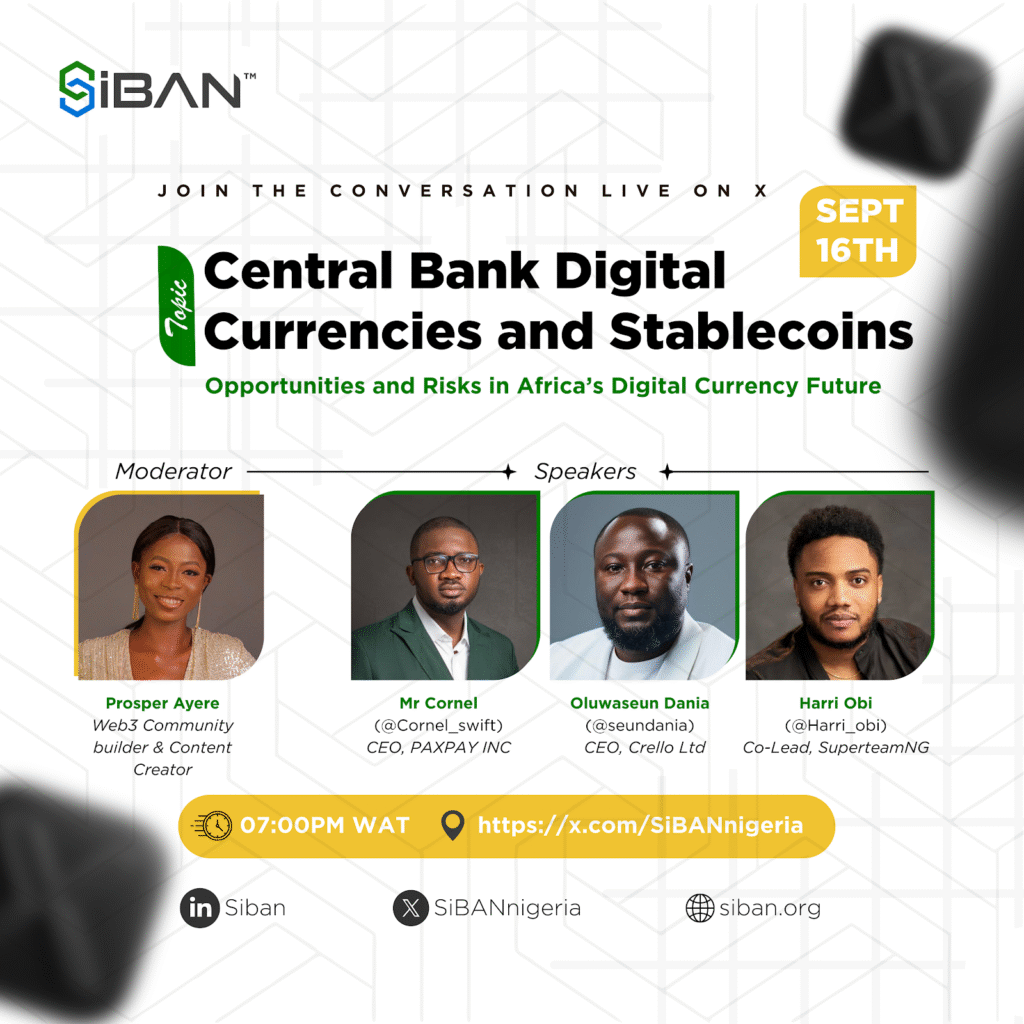
Nigeria’s journey toward a cashless and digitally inclusive economy is accelerating, and the debate around the future of money is growing louder. To advance this conversation, the Stakeholders in Blockchain Technology Association of Nigeria (SiBAN) recently hosted a live discussion on X (formerly Twitter) exploring the opportunities and risks of Central Bank Digital Currencies (CBDCs) and stablecoins in Africa’s digital finance landscape.
Moderated by Prosper Ayere, a web3 community builder, the session brought together leading voices in blockchain, fintech, and digital assets to examine how these two emerging forms of digital currency could reshape Nigeria’s financial future.
Setting the Stage: Framing the Digital Currency Debate
Opening the conversation, Prosper Ayere explained that the goal of the dialogue, titled “Central Bank Digital Currencies and Stablecoins: Opportunities and Risks in Africa’s Digital Currency Future” was to help chart a course for Africa’s evolving digital economy.
“This conversation is about exploring the challenges and innovations shaping Africa’s digital economy,” she said, emphasizing the importance of collective insight in shaping policy and practice.
Stablecoins: A Path to Stronger Local Currencies
Oluwaseun Dania, CEO of Crello Limited, highlighted the transformative potential of a well-regulated, naira-backed stablecoin. He argued that such a currency could reduce dependence on the U.S. dollar by enabling Nigerians to trade directly with other countries that issue their own digital currencies.
“If we have stablecoins, we have an exchange, we have a platform where people can actually exchange directly,” Dania explained. “It will definitely increase the dependence on the local currencies.”
He further noted that stablecoins could incentivize Nigerians to hold naira by offering competitive interest yields potentially higher than those available from commercial banks. Such a mechanism, he said, could curb the “dollarization” of African economies while encouraging the use of local currencies for everyday transactions and cross-border trade.
CBDCs: Potential and Pitfalls
While stablecoins offer a private-sector solution, Cornelius Oroke, CEO of Paxpay, underscored the promise of a well-implemented CBDC as a public-sector innovation. He described CBDCs as a game-changer for cross-border remittances and financial inclusion, particularly in rural areas where traditional banking services are limited.
“If it works like what it is supposed to be, it is going to be very fast and it will cost less,” Oroke said, noting that a CBDC could enable low-cost, near-instant transfers and strengthen the naira by reducing reliance on the U.S. dollar. Importantly, he added, an effective CBDC could operate offline through USSD or SMS, bringing digital financial services to users without internet access and reducing reliance on black-market channels.
Trust, Regulation, and User Adoption
For Harri Obi, Co-Lead of SuperteamNG, the key challenge is not technology but trust. Reflecting on the limited adoption of Nigeria’s eNaira, Obi warned that over-regulation and insufficient stakeholder engagement can stifle innovation before it takes root.
“The government is taking a lot of wrong steps,” he observed. “When they found out that this thing wasn’t scaling and wasn’t growing was when they decided to come and have a conversation with digital asset stakeholders. By then, it was late.”
Obi emphasized the importance of meeting users where they are, calling for simpler onboarding processes and the use of familiar platforms such as WhatsApp and USSD to reach merchants, agents, and everyday Nigerians. “African fintechs must build products people actually want to use,” he stressed.
SiBAN’s Role in Shaping the Future
As Nigeria’s self-regulatory body for blockchain and digital assets industry, SiBAN continues to provide a neutral platform where innovators, policymakers, and market participants can engage in constructive dialogue. Conversations like this help ensure that digital currency policies are informed by those building real-world solutions and by the needs of the people they serve.
By facilitating discussions on CBDCs and stablecoins, SiBAN reinforces its commitment to a future where innovation and accountability go hand in hand, where digital currencies can enhance financial inclusion without compromising user trust or market stability.
The debate around CBDCs and stablecoins is far from settled, but one thing is clear: Nigeria and Africa are at a critical juncture in the evolution of money. Whether through central bank initiatives, private stablecoin projects, or a hybrid of both, the focus must remain on accessibility, transparency, and real-world utility.
SiBAN will continue to convene conversations that bring clarity to these issues, advocate for responsible regulation, and support innovators who are shaping Africa’s digital currency future.
You should be a part of this too. Send us a mail membership@siban.org and join our free telegram group.

